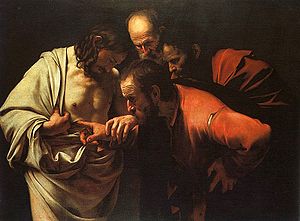We are now on the seventh day of the Easter Octave, eight days that are one long, glorious day, so this Friday is treated as a full solemnity, a Sunday, a day to rejoice and sing for joy, so once again, a blessed and joyous Easter to all our readers!
The reason for elation is obvious enough: Christ’s triumph over death, entropy, the dissolution of all things, and the kingdom of darkness.
Yet it was not obvious right away, and the Apostles were understandably mystified, even terrified, when they saw the Risen Christ, but it was a fear mixed with much joy and gladness.
The accounts of these meetings are indeed mysterious: Appearing when and how He wills, now here, now there, not recognized, then recognized, walking through walls and locked doors.
We might be tempted, as was Peter, to think this ‘new’ Christ some sort of ethereal and almost-not-there ‘ghost’, as did the Apostles. But in today’s Gospel, recounting His appearance by the lake of Tiberias (or Galilee, as you will), Christ asks the mystified Apostles if have anything to eat; at His command, they miraculously catch a whole lot of fish, which, in Saint Luke’s account, he eats before their eyes. So His body was a real body, but one with new and rather astounding powers.
When I ponder this, I am drawn to two thoughts:
First, to C.S. Lewis’ delightful allegory The Great Divorce, published in 1945 just as the World War was ending, about a group of dead people brought to judgement. When they step off onto the ‘lawn’ outside the pearly gates, the grass hurts their feet because it is too ‘real’ for them, too solid, just too much ‘there’.
Second, at the dawn of the century, in 1909, a New Zealander physicist, Ernest Rutherford, working at McGill university here in Canada, conducted an experiment in which he shot tiny alpha particles (basically, helium nuclei, or two protons) through a thinly-stretched sheet of gold foil. To his surprise, 99.999% of the particles went through the foil as though nothing were there, with a very small percentage (about one in ten thousand) bouncing off at odd angles.
From this rather fantastic phenomena, Rutherford proposed a model of the atom which has stood, with some quantum modifications, to this day: That most of what we know as ‘matter’ is quite literally empty space, an electron cloud, with a tiny nucleus in the centre, where all the ‘mass’ is (if an atom were the size of the Houston Astrodome, the nucleus would be a marble floating in the centre). We, and all we see around us, is more or less not much there at all, veritable clouds of electricity. If our electrons were to stop moving, we would literally collapse almost to nothing.
Hence, Christ could walk through doors not because He was less real than they were, but more so. To His new reality, it was the doors and walls that were ethereal, almost ‘not there’, and He the Real One, the Truth and the Life.
A comforting thought? Well, it is for me, and perhaps for you, as we live in these all-too-limited bodies, with their aches, pains, blemishes and imperfections, to which we should not cling too closely, for they are returning by the inexorable second law of thermodynamics to the nothing from which they came. But every day older is also a day closer to that new and much-improved glorified and resurrected body, the same as this one, but also very, very different.
It is Christ Who offers us that permanence we call ‘eternity’, if we but choose to follow Him, to live in the truth and conform ourselves thereto. And the bodies we receive in that state are far more real, more perfect, than these animal bodies in which, or rather by which, we now live, as Saint Paul does his best to describe at the end of his first letter to the Corinthians:
So is it with the resurrection of the dead. What is sown is perishable, what is raised is imperishable. It is sown in dishonour, it is raised in glory. It is sown in weakness, it is raised in power. It is sown a physical body, it is raised a spiritual body. If there is a physical body, there is also a spiritual body…
Just as we have borne the image of the man of dust, we shall also bear the image of the man of heaven. I tell you this, brethren: flesh and blood cannot inherit the kingdom of God, nor does the perishable inherit the imperishable.
Lo! I tell you a mystery. We shall not all sleep, but we shall all be changed…
And as Saint Peter did this morning from the boat on the Sea of Galilee, when we see that ‘It is the Lord’, we should cast ourselves into the sea to find him, even though, or rather because, we quite literally have nothing on, and I’m not primarily talking about clothes.
Indeed, death, where is thy sting?
Christus resurrexit! Dominus surrexit vere! Alleluia!

